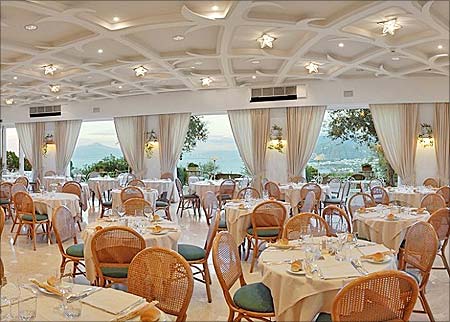
Next time you go to a star hotel, look closely at the number of flowers -- or even the kind -- in the arrangement on the restaurant table. Or count the number of towels in the bathroom and the number of sheets in the writing pad in the conference room. It is possible that you may find fewer or cheaper flowers, fewer towels and lesser pages.
The economic slowdown and the battering tourism has taken have called for some smart house-keeping, and five-star hotel chains in the country are trying their best to behave like prudent housewives. It is a tightrope walk for them. They have to cut costs without being seen as reducing customer amenities.
Sector analysts will tell you that though their revenue streams are down 15 per cent in the last one year, profits are down at least 40 per cent. Hotels cannot lay off staff they have trained over the years. If the economy turns around and business gets back on track, they will have to spend a huge sum to get the same people back.
Text: Anoothi Vishal
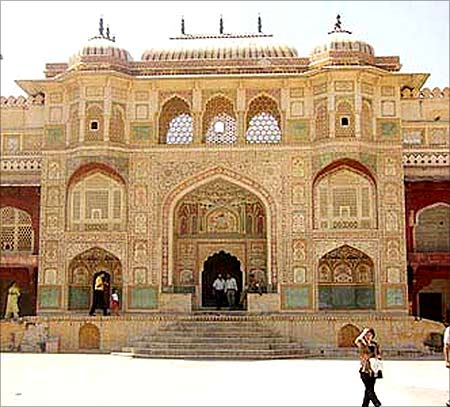
The scalpel is thus being wielded on the invisibles.
Take, for instance, towels placed in guest bathrooms. On an average, eight to ten of these are placed in each facility (including face and hand towels and so forth) and each time one is laundered, it costs the hotel Rs 10.
After a hundred washes, the towel needs to be replaced as it is no longer deemed fit for use. A new replacement costs about Rs 250, given the quality most five-star hotels insist on.
Multiply all this with the 300-400 rooms in a big hotel, the number of guest nights per room, and the number of hotels in a big chain, and you are looking at substantial costs.

Small measures
In these hard times, many large hotels, explains a source in the industry on conditions of anonymity, are cutting down on the number of towels by one -- a number unlikely to be missed by a guest but that can potentially save Rs 10-15 crore (Rs 100-150 million) annually for a chain.
A number of hotels have, in fact, become more conscious of a common practice abroad where guests can indicate whether they would like to reuse the linen and the towel for a second night instead of having it laundered after just a night's use.
At Galaxie, a boutique hotel in Gurgaon, General Manager Vivek Sharma says that about 200 wiping sheets were made from the discarded sheets (after 100 washes), saving more than Rs 20,000 in the process (each wiping sheet costs Rs 100).
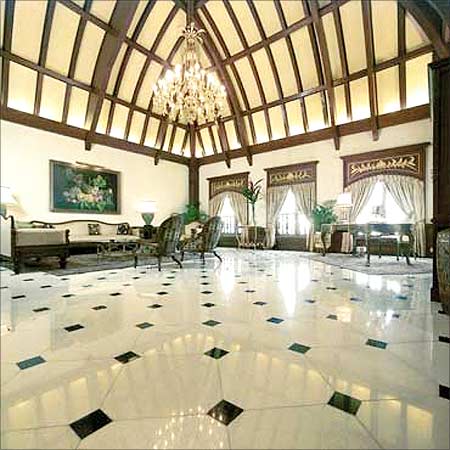
Another simple measure that many hotels are said to be taking is a reduction in the size or number of pages in the stationery provided in guest rooms (on an average, three pads are placed in a room) or at conference facilities.
If the number of pages in a 20-25 notepad is cut by five, the guest is unlikely to be affected, but with each sheet of paper costing 20 paise, a hotel chain can look at saving Rs 3-5 crore (Rs 30-50 million) annually.
Newspapers delivered to guest rooms are now ordered only according to occupancy -- not according to the number of rooms in the hotel.
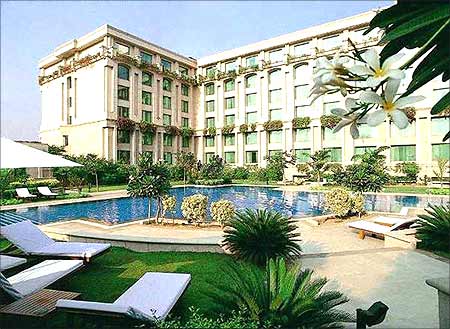
These are just some of the figures floating around in the hospitality circles, though, when questioned formally, few in the industry acknowledge them. That is understandable. The standard reply is that guest amenities have not been touched, even though backroom operations have been -- extensively.
"I have stopped doing these things," says Harinder Singh, general manager at The Grand, a hotel in New Delhi that reopened last week (it had shut last year after a fire had destroyed one of its popular restaurants) bang in the midst of the slowdown.
Singh remembers her earlier stint in Nepal, when faced with huge deprivation, the hotel had reduced the size of notepads for guest use as a cost-saving measure, "but people had complained about us cheating them with inferior stuff!"
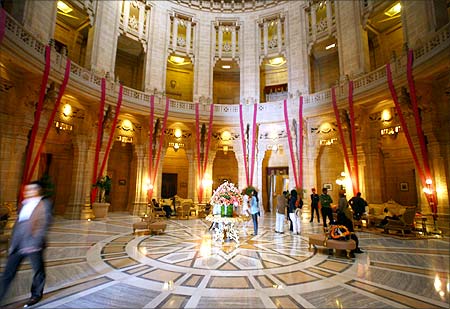
This time round, Singh admits to substantial measures but all at the back end. At the hotel, pressure reducing valves have been inserted in taps in all public areas and particularly the kitchens -- because stewards and cooks don't always close the taps "each time they wash a plate." This saves about 30 per cent of the water consumed, says Singh.
Similarly LED lights in the lobby and public areas save 70 per cent of electricity consumption and auto flush systems in the rest-room save up to 40 per cent water.
Similarly, ice plants, those huge walk-in freezers and chillers in hotels, are notorious energy guzzlers. These need to run 24 hours and running one freezer for one hour approximately costs Rs 1,500, says a source in the food and beverage section of a leading hotel.
A big hotel has 10-15 of these chillers and it is quite possible to switch these off for at least one hour a day, thus saving about Rs 15,000 per day.

Heating a swimming pool on the other hand, in winter, costs Rs 20,000 each time. So every time you avoid heating it, you make a substantial saving too.
Some hotels have installed 'pre-filters' in their swimming pools.
Each swimming pool comes with a fixed sand filter that needs to be washed every day, wasting water. A pre-filter, installed before the sand filter, can be taken out and washed separately thus saving water -- about 5,000 litres per week.
Then, there are spot lights near pastry counters and computers that usually remain switched on 24x7 in front offices and business centres. New saving measures mean that these are now switched off when not needed.
Manpower is being trained in the need to conserve energy and water (taps with sensor even in staff lockers, not just guest bathrooms) and even food in the staff cafeteria.
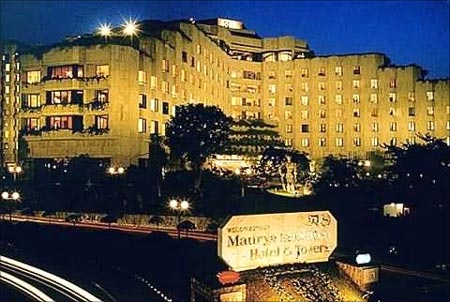
Recycle, reuse
These are the kind of measures that all hotels commonly admit to -- not in the least because they are also deemed eco-friendly.
ITC Maurya, for instance, already has a water recycling plant that uses all the water that would have been otherwise wasted for the gardens. And hotels, in the wake of the downturn, are being careful of reusing both sides of paper as well, at least for their own internal operations.
At the Jaypee group, in fact, executives say that old envelopes are reused to send across inter-department notes, apart from trying to ensure that promotional events at sister properties remain the same (in so far as that market permits) so that the same collaterals can be used.
"Inventories are not being stacked up, we are being very careful about what to order, including things for the kitchen such as chopstick covers that would be ordered in bulk before," says an executive.
The staff that is travelling is encouraged to use cheaper taxis and not the ones from the hotel at 'five-star rates.' At other hotels, CNG vehicles are now being deployed to drop and pick up staff.
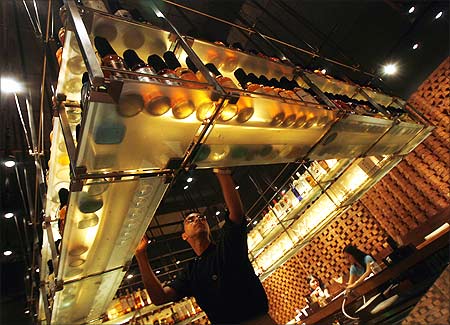
While corridor lights that automatically switch on or off, detecting human presence, may be a feature that you have noticed at some of these hotels, there are stricter rules for the workforce.
At The Park group, for instance, lights and fans go off at 6 pm and the staff is encouraged to finish all their work before that. What happens if they can't? "May be you can keep only your side of the light on," says an executive.
And at the ITC hotels office, detects an old-timer, the black bags lining the stainless steel bins have gone -- entirely appropriate "because what we throw is never wet, it is just paper and such and the bins can be emptied out and scrubbed clean easily."

With occupancies down, commonsense measures like not opening up entire floors if not needed are in place at many properties.
Do notice the flower arrangements next time you step into a posh lobby or restaurant. These are likely to be less elaborate (and expensive) and instead of the standard 10 roses in a glass vase that cover up the table's surface area (each costing about Rs 8; approximately 30 tables to a restaurant), a single big flower may have been used.
Try doing the accounts yourself.